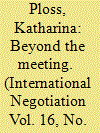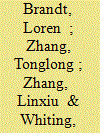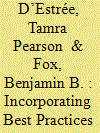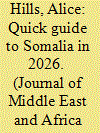| Srl | Item |
| 1 |
ID:
105189


|
|
|
|
|
| Publication |
2011.
|
| Summary/Abstract |
Intercommunity dialogue encounters are a crucial tool for constructive conflict resolution. This research examines grassroots dialogue encounters with regard to the societal position of the participants, as well the situation `on the ground' as influential to the transfer process. Interviews in Northern Ireland and Kosovo with community activists stressed the effectiveness of personal characteristics of dialogue participants when it came to transfer. Moreover, the readiness - affected by socio-economic conditions as well as external/secondary conflict parties - of the peer group to listen to its participant seemed fundamental.
|
|
|
|
|
|
|
|
|
|
|
|
|
|
|
|
| 2 |
ID:
156608


|
|
|
|
|
| Summary/Abstract |
Through two rounds of land contracting, rural households have been allocated a bundle of rights in land. We observe significant differences across villages in the amount of land to which villagers retain a claim and the institutional mechanisms governing the exchange of land rights. This study reveals the perpetuation and expansion of non-market mechanisms accruing to the benefit of village cadres and state officials and only limited emergence of market mechanisms in which households are primary beneficiaries. It identifies factors in economic, political and legal domains that incentivize and enable state officials and local cadres to capture returns from use of land. Relatedly, the study finds differences in conflict over property-rights regimes. Drawing on a pilot survey carried out by the authors in November of 2011 in Shaanxi and Jiangsu provinces (192 households in 24 villages), this paper seeks to explain heterogeneity and change in property-rights regimes over time and across space.
|
|
|
|
|
|
|
|
|
|
|
|
|
|
|
|
| 3 |
ID:
142600


|
|
|
|
|
| Summary/Abstract |
This paper examines the role played in India by fixers—intermediaries connecting teachers with politicians and government officers—in the teacher transfer process. It shows how the state’s efforts at education reform and accountability are compromised by entities operating outside the realm of policy.
|
|
|
|
|
|
|
|
|
|
|
|
|
|
|
|
| 4 |
ID:
176502


|
|
|
|
|
| Summary/Abstract |
Track Two processes were developed to facilitate movement in difficult international conflicts. Since Montville first coined the term, Track Two processes have considered deliberate and strategic ways to bring together adversaries in unofficial, private face-to-face interactions that allow for joint analysis and mutual learning. Such processes create the conditions for more nuanced problem definition and solution exploration. Ideally, these insights are then transferred into official peace processes, policymaking and decision-making. Transfer acknowledges a strategic dimension to planning for change; Track Two approaches abridge and accelerate the long-term accumulation approach by the strategic choice of participants, agenda and goals. This article reviews and summarizes our knowledge to date about how best to encourage Track Two inputs into negotiation and other Track One diplomatic efforts. It then offers a checklist for designing initiatives to best promote both intergroup learning and timely transfer to generate effective change.
|
|
|
|
|
|
|
|
|
|
|
|
|
|
|
|
| 5 |
ID:
180655


|
|
|
|
|
| Summary/Abstract |
The political and developmental challenges confronting Somalia are entrenched and unlikely to change significantly over the next five years. This is notably so for the transfer of security and policing responsibilities from international organizations to Somali authorities. Consequently, seeking to distinguish between Somalia’s current and future challenges is an artificial exercise that has more to do with the aspirations of the international community than with local realities. Change will undoubtedly occur, but while the strategic issues dominating the international agenda in 2026 will be different from those prioritized in 2021, the underlying trends and issues influencing the goals and behavior of Somalia’s powerbrokers and significant security actors will be much the same as they are today: the security marketplace will continue to reflect the primacy of clan-based calculations and internecine rivalries. In other words, it will be business as usual.
|
|
|
|
|
|
|
|
|
|
|
|
|
|
|
|
| 6 |
ID:
139392


|
|
|
|
|
| Summary/Abstract |
Despite saying that they will never “talk to terrorists,” many countries have done so. Often these dialogues have included a component of so-called “Track Two Diplomacy.” This article examines whether such a dialogue could be held with al Qaeda and other such groups. Research demonstrates that dialogues have been useful in ending terror campaigns in certain circumstances, but that they were never the decisive element. Where they have been useful, dialogues have helped to distinguish those members of terror organizations who are willing to talk from the hardliners, in helping to develop ‘acceptable’ players on the other side, and in allowing the two sides to better understand each other. The article finds that a dialogue with the hard core of al Qaeda is likely impossible, but that some elements may be willing to talk. Such dialogues will be localized and will be about specific concerns and, like in other cases, will be about seeing if there are elements of the movement that can be detached from the hard-core base. Track Two may have a role to play in these dialogues, but expectations should be kept modest.
|
|
|
|
|
|
|
|
|
|
|
|
|
|
|
|